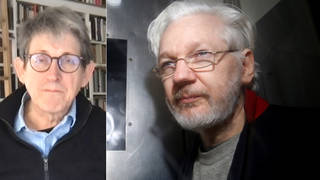
Topics
Risking prison again, nuclear whistleblower Mordechai Vanunu defies Israeli government restrictions and speaks for the first time to a national audience in this country.
Mordechai Vanunu worked as a nuclear technician at Dimona, Israel’s secret nuclear installation from 1976 to 1985. He worked there at a time when Israel was insisting it would not be the first to introduce nuclear weapons to the Middle East. What Vanunu discovered is that Israel had secretly developed an extensive nuclear program, hiding its existence from the Israeli people and parliament, and the world.
Vanunu leaked information and photos of Israel’s nuclear weapons program to the Sunday Times in London. He was subsequently kidnapped by Israeli spy agency Mossad in Italy and then jailed. He would go on to spend 18 years behind bars including 11 in solitary confinement.
He was released on April 21 under strict government restrictions.
Democracy Now!'s Amy Goodman reached Vanunu on his cell phone in East Jerusalem where he has been staying since his release in April. He defied the Israeli government's restriction on speaking with foreigners to talk with us.
READ TRANSCRIPT Today, a Democracy Now! exclusive. Risking prison again, nuclear whistleblower Mordechai Vanunu defies Israeli government restrictions and speaks for the first time to a national audience in this country.
Vanunu was released from prison in Israel earlier this year after serving 18 years for revealing to the world that Israel had a nuclear arsenal. For more than 11 of those 18 years, he was kept in solitary confinement.
Today we spend the hour with Mordechai Vanunu, who is defying an Israeli government ban to speak to us.
Vanunu worked as a nuclear technician at Dimona, Israel’s secret nuclear installation from 1976 to 1985. He worked there at a time when Israel was insisting it would not be the first to introduce nuclear weapons to the Middle East. What Vanunu discovered is that Israel was secretly developing an extensive nuclear program, hiding its existence from the Israeli people and parliament, and the world.
The Dimona facility where Vanunu worked harbored an underground plutonium separation plant operating in strict secrecy. As the years went by Vanunu grew increasingly troubled as he realized his work was part of Israel’s nuclear bomb program. In 1985, before leaving Dimona, he took extensive photographs inside the factory.
Traveling through Asia with the film in his backpack, Vanunu made his way to Sydney, Australia, where he converted to Christianity and joined an Anglican church social justice community where he shared the story of his nuclear background.
The London Sunday Times, learned of his story and sent a reporter to Sydney. The newspaper then flew Vanunu to England, where his photos and facts were further checked by British scientists familiar with nuclear weapons.
Vanunu’s story, published October 5, 1986, gave the world its first authoritative confirmation that Israel had become a major nuclear weapons power, with material for as many as 200 nuclear warheads of advanced design. But days before the story was published, Vanunu was lured to Rome by a female Mossad agent. Vanunu says he was kidnapped, drugged and put on an Israeli cargo vessel. It was during this period that the famous picture was taken of him in the back of a van pressing his hand to the glass with his name and the details of his abduction scrawled on his palm.
In Israel, he was charged with treason and espionage. His trial was conducted in total secrecy and he was sentenced to 18 years in prison. He was released earlier this year after serving his full term.
On April 21st 2004 he walked out of prison in the coastal town of Ashkelon flashing a peace sign and waving to cheering supporters. At an impromptu press conference, Vanunu said he was proud of what he did and described what he called “very cruel and barbaric treatment” at the hands of Israeli intelligence and the military.
Since his release, Vanunu has faced restrictions placed on him by the Israeli government. He is not allowed to leave the country, he has to register wherever he goes in Israel and he can’t speak to foreigners. Despite these restrictions, late yesterday around midnight Israel-time, he agreed to talk.
Listen carefully, he is not easy to understand. We reached him on a cell phone in East Jerusalem.











Media Options